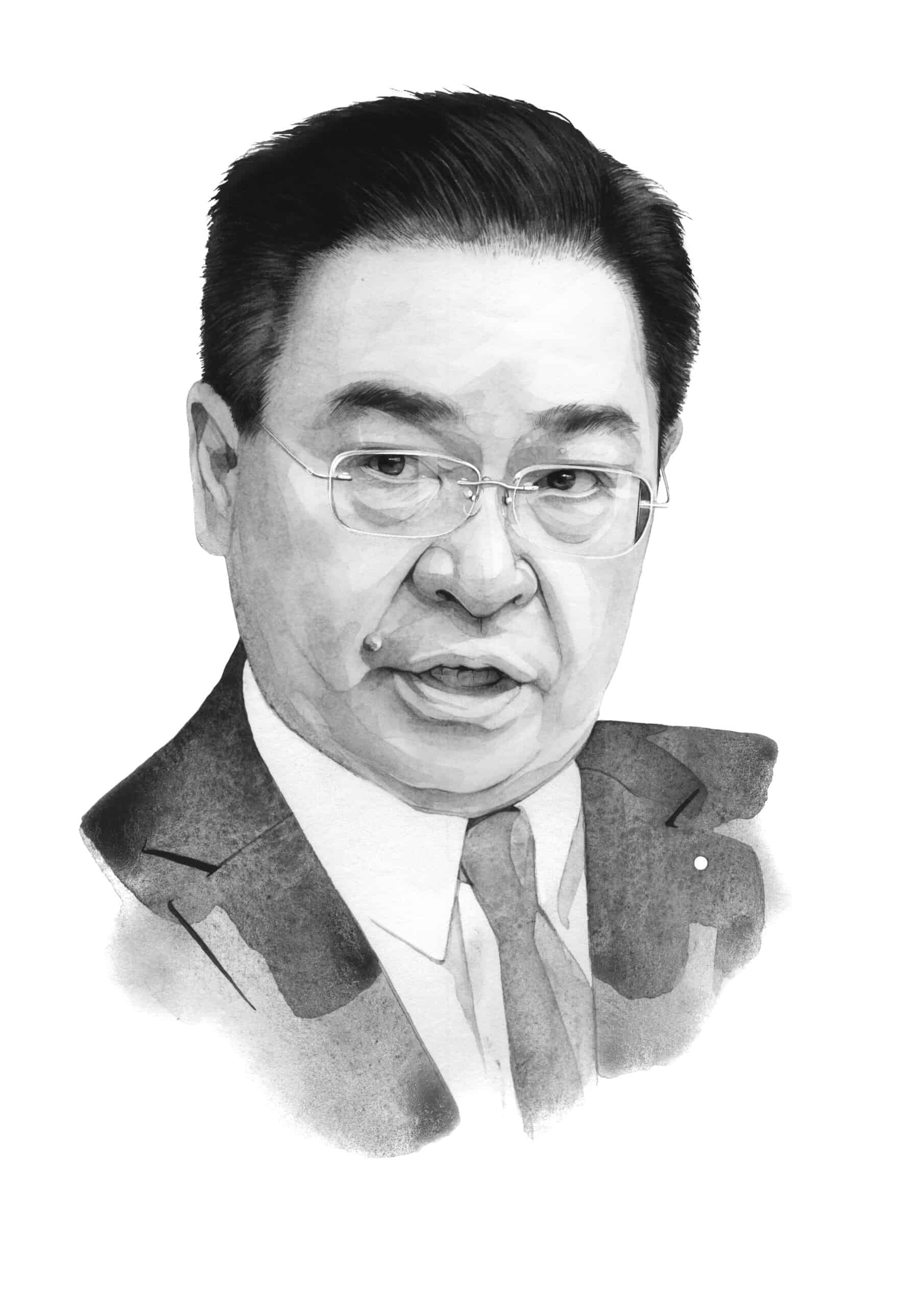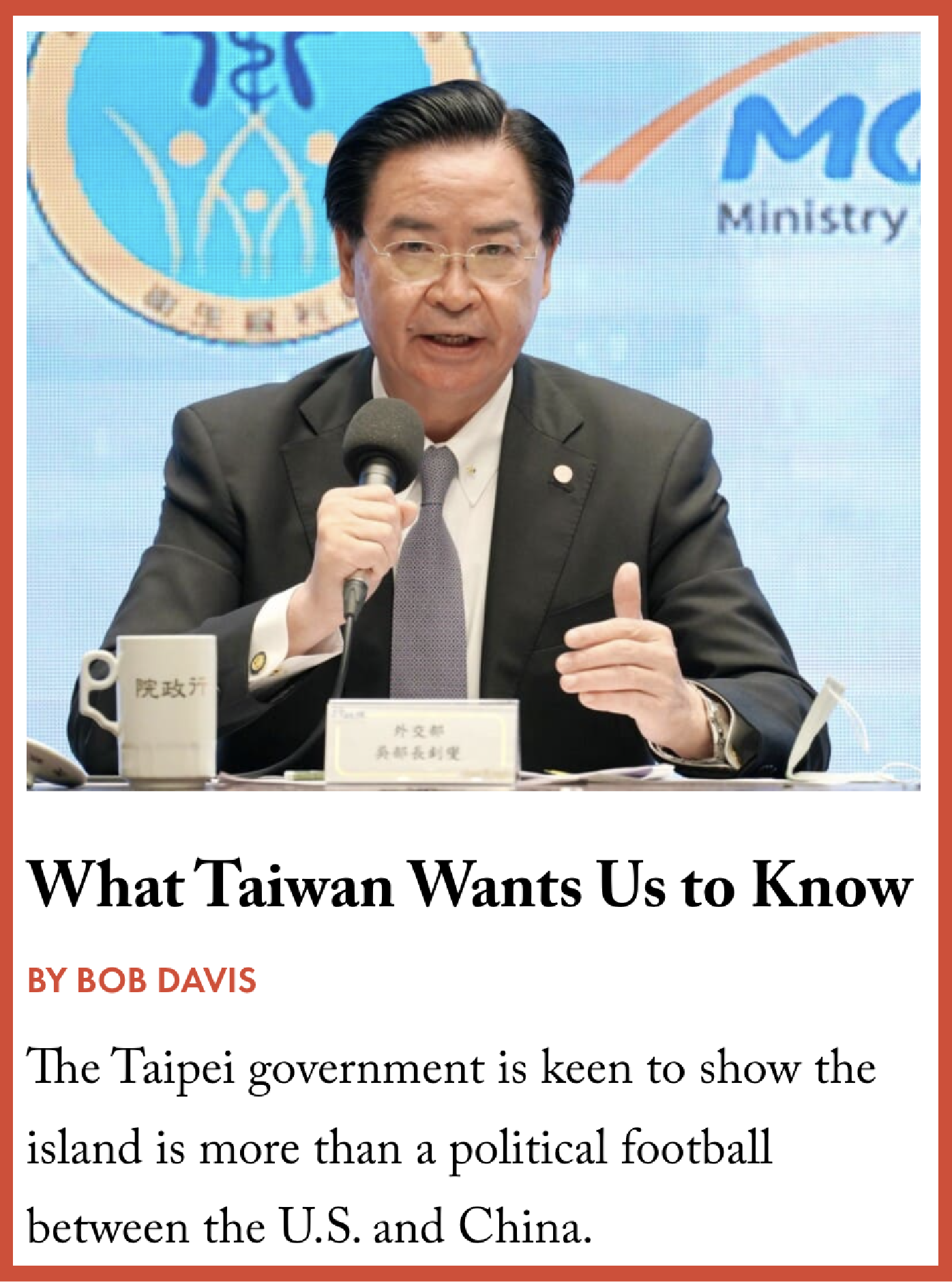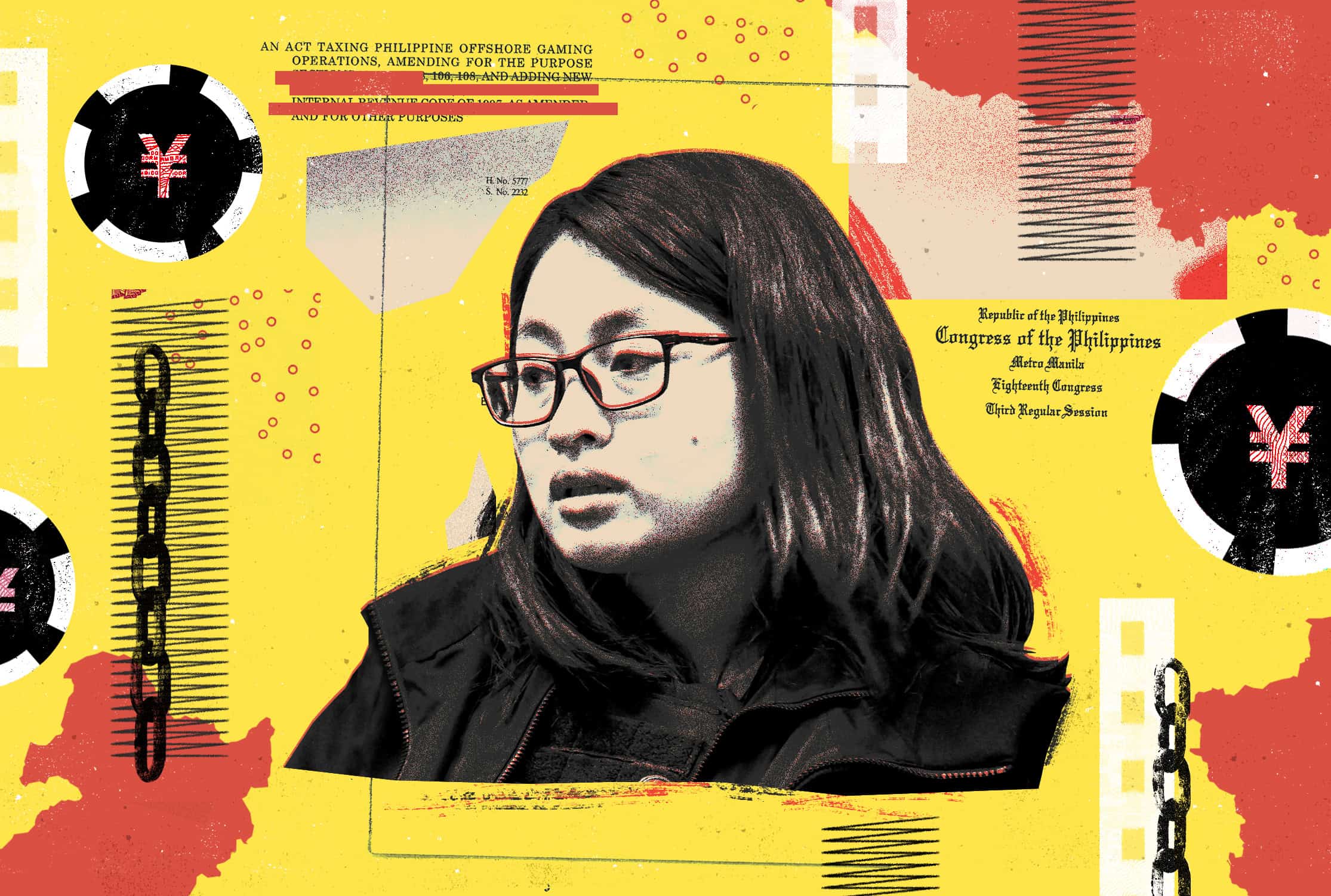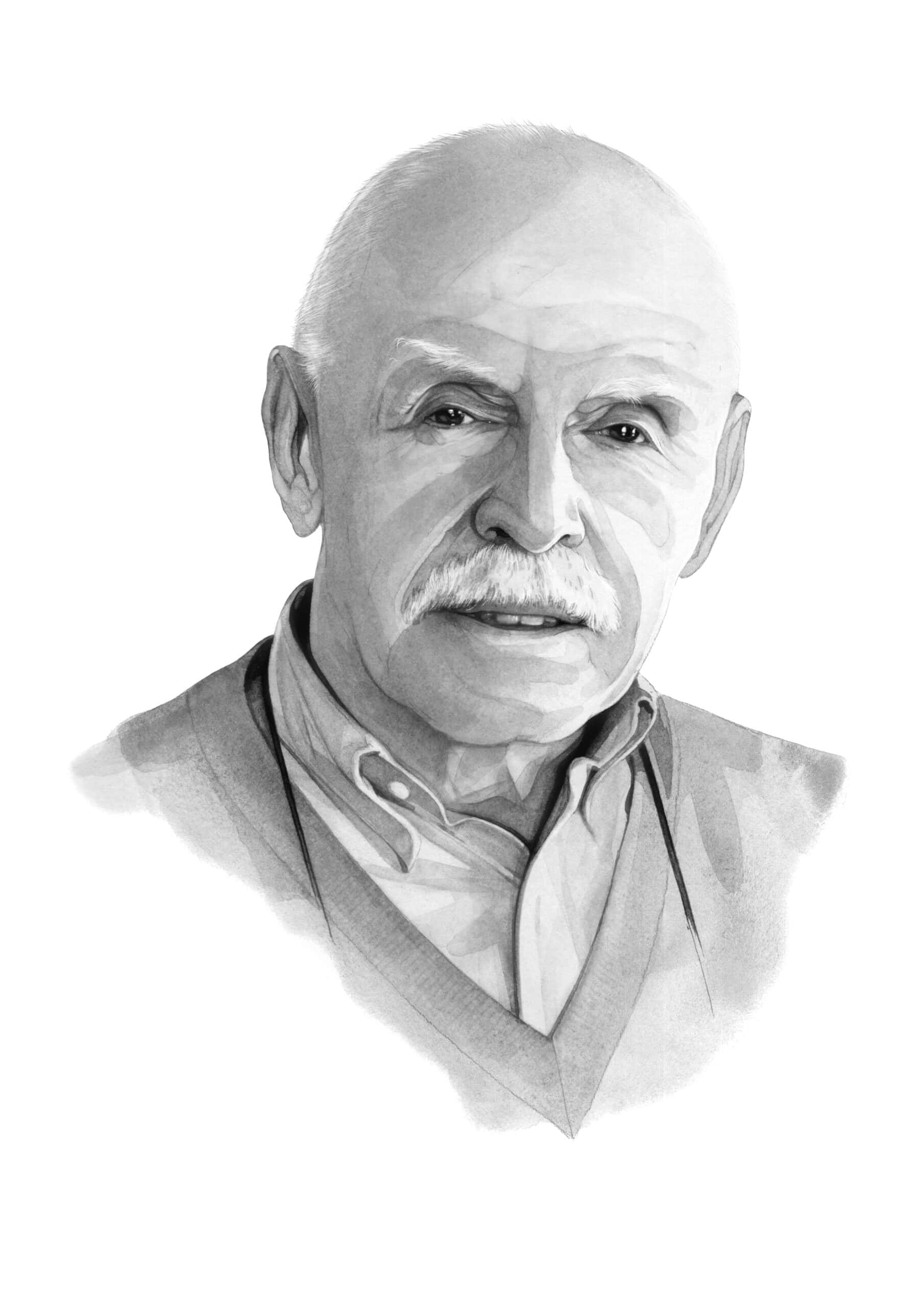Jaushieh Joseph Wu has spent his career carving out an international identity for his native Taiwan. He was appointed Minister of Foreign Affairs for the Republic of China (Taiwan) in February 2018, after serving as the top aide to President Tsai Ing-wen and after a stint as secretary-general of the National Security Council of Taiwan. He was Taiwan’s chief representative to the United States, as head of the Taipei Economic and Cultural Representative Office in Washington, D.C. from 2007 to 2008, and continued as the Democratic Progressive Party’s representative in Washington from 2012 to 2016, while the DPP was out of power. He also headed Taiwan’s Mainland Affairs Council from 2004-2007. Dr Wu earned his PhD in political science from Ohio State University in 1989, writing his thesis on democratization in Taiwan at a time when martial law had only just been lifted, and competitive elections were still in the future. He spent almost 13 years at National Chengchi University’s Institute of International Relations before entering government. The following is a lightly edited transcript of a recent interview in Taipei.

Illustration by Kate Copeland
Q: You have a hard job, because you are the foreign minister of Taiwan, which is not recognized internationally as a state by most other nations.
A: I wonder if you have heard this joke before. The president must hate me very much to appoint me to this position!
This is the hardest foreign ministry position anyone can imagine.
What has been your overall strategy?
We try to work on several things at the same time. For example, we try to target some like-minded partners so that we can improve relations with them. These like-minded partners include those in North America, in Europe, and in the Indo Pacific. Because of our hard efforts in the last few years, I can tell you that our relations across various domains — with the United States, Canada, U.K., Germany and France, and also EU and NATO, and in the Indo Pacific, Japan and Australia — have made tremendous improvements. We have also been working very hard on Central and Eastern European countries who were run by Communist [parties] before the end of the 1980s. They are highly supportive of Taiwan, democratic Taiwan, because they still remember the old days of Communist rule. They look at Taiwan with a lot of sympathy, that Taiwan has been oppressed or coerced by Communist China. So, they are showing a tremendous amount of support for Taiwan as well. As a result, our relations with Central and Eastern European countries are also making tremendous progress. So this is our direction.
| BIO AT A GLANCE | |
|---|---|
| AGE | 69 |
| BIRTHPLACE | Dacheng Township, Changhua County, Republic of China (Taiwan) |
| CURRENT POSITION | Minister of Foreign Affairs, Republic of China (Taiwan) |
We are also trying to see whether we can do more for our diplomatic allies [Taiwan is still formally recognized by 13 countries, including the Vatican, Guatemala, Eswatini, Haiti, and several Caribbean, Latin American and Pacific island nations]. As you can see, China is working very hard on our diplomatic allies, trying to snatch them off one-by-one. This has been very challenging to us, so we have been working very hard to consolidate our relations with those remaining diplomatic allies.
Has the Russian invasion of Ukraine made that job easier?
I wouldn’t say so, but we gained some new insights because of the Russian invasion of Ukraine. The reason is very simple. The Taiwanese people saw Russia invade Ukraine without any provocation. The people noticed that they might experience the same thing. China may also use force against Taiwan. When people see the footage of the atrocities and destruction going on in Ukraine, people say ‘this may happen to Taiwan as well’. As a result, in the Ministry of Foreign Affairs’ outreach to like-minded partners, we see more support from the people.
| MISCELLANEA | |
|---|---|
| PUBLISHED BOOK | Taiwan’s Democratization: Forces behind the new Momentum, Oxford University Press, 1995 |
| FAVORITE MUSIC | Pyotr Ilyich Tchaikovsky |
| FAVORITE FILM | My Life as a Dog |
| MOST ADMIRED | Winston Churchill |
We are also receiving more support from like-minded partners. They are looking at a war, just the way we look at a war. Many of those like-minded partners, especially from the parliamentary side, looked around the world after the war began in Ukraine and asked where else it might happen. They look at Taiwan as a possible place where democracy is going to be attacked by authoritarianism, so many of those parliamentarians are showing support to Taiwan.
We have been receiving lots of visitors from these democratic countries, from Europe, from North America, and also from the Indo-Pacific. These visitors show the Taiwanese people that we are not alone, that we have democratic friends backing us up. That makes the Ministry of Foreign Affairs, or even the nation, even stronger in dealing with the coercion coming from China.
During this trip [to Taiwan], I’ve heard people “from all walks of life”, as the Chinese like to say, saying that they don’t think the PRC actually wants to fight Taiwan. And so the most important thing is not to provoke, not to poke the bear. How do you respond to that?
Taiwan is a democracy. And therefore, there are all kinds of ideas allowed here in Taiwan. They are free to choose the candidate or politicians to support. There is an open environment in Taiwan.
…the results of Chinese harassment, or aggression or coercion against Taiwan, is that the Taiwanese people’s determination to defend Taiwan, to defend our sovereignty and our democratic way of life is greater than ever.
Of course, such statements are heard here in Taiwan — that we should not provoke China. And indeed, the policy of the Taiwanese government right now is also to try not to provoke China. We understand that the result of a war with China is going to be disastrous for Taiwan. And also, it would have global consequences. And therefore, as responsible policy makers or as a responsible government, we should try to avoid war, and this is what we have been pursuing.
At the same time, we also understand that one of the best ways — other than not provoking — when dealing with a big bully is to deter. Deterrence is a very important part of our strategy as well. It’s not only Taiwan pursuing deterrence, we are also working together with other like-minded partners to show collective deterrence.


President Tsai Ing-wen watches a demonstration conducted by the 1st Battalion of the 234th Army Brigade of the Mechanized Infantry, during the Spring Festival, January 6, 2023. Credit: 總統府 via Flickr
For the Taiwan side, we are trying to strengthen our defense capability by making more investment in our defense, and we are engaging in military reform so that we are more capable of fighting asymmetric warfare.
We are also working with more like-minded partners, so that we get more international support. This is going to be a very strong part of our deterrence and trying to prevent war from taking place. If we were only focused on ourselves, it would be very difficult for Taiwan, so we are working with many like-minded countries, like the United States, Japan, et cetera. They’ve been showing more support for Taiwan. If you look at the language they come out with in their summits, or in their 2+2s [diplomatic dialogues involving defense and foreign affairs], they’re very open. They talk about the importance of peace and stability in the Taiwan Strait. I think this is very strong language, and it has become a consensus among all these leading democracies. They’re also talking about opposing unilateral changes to the status quo across the Taiwan Strait, and you can see how strong that can be as a deterrence against Chinese aggression against Taiwan. Nowadays they talk more about peace and stability across the Taiwan Strait as an integral part of global security and prosperity.

What they are saying is that almost half of global goods flow through the Taiwan Strait; and the highest end semiconductor products, actually the majority of them, come from Taiwan. To be more exact, about 90 percent of top-end semiconductor chips are produced here in Taiwan. I think it’s becoming a global consensus that if this supply chain is disrupted, if war is taking place, it will have major consequences for the world economy.
You are trying to prevent war, but then how do you handle the constant grey-zone provocations?
This is a more critical issue for us to deal with right now. The Chinese have been harassing our airspace, our waters, adjacent waters, and they have also been crossing the median line of the Taiwan Strait. It is a serious problem for us. And we continue to send our airplanes and our ships to prevent China from coming any closer.
The Chinese motivation, as we understand it, is not to initiate any war, even though close encounters in mid-air or on the high seas are likely to lead to accidents. I think the Chinese motivation is not to start a war unprovoked. They want to coerce Taiwan further. They want to condense our defense depth, they want to reduce our response time. And they also want to press the Taiwanese people to the degree where they may want to say: “That’s it! We don’t want to fight any longer. We just want to surrender.”

This is probably what China wants, so they continue to engage in grey-zone tactics against Taiwan. But you see, the results of Chinese harassment, or aggression or coercion against Taiwan, is that the Taiwanese people’s determination to defend Taiwan, to defend our sovereignty and our democratic way of life is greater than ever. So the Chinese tactics don’t seem to be working.
Moreover, the international community seems to have understood China’s motives in its military coercion against Taiwan, and it has provoked a stronger international reaction than before. I think it has allowed the international community to look at Chinese activities, not just over Taiwan, but in other areas, for example, over the East China Sea, where Chinese intrusions into disputed waters are more frequent than before. They are happening almost on a daily basis these days, and this has provoked Japan to speed up its defense capabilities and its preparation, and to revise its military defense strategy. Japan wants to double its military budget for the next five years, and it is deploying weapons that would allow Japan to be able to counter-strike against China. This is very new. You can tell Japan has been seeing Chinese aggression from their own land.

If you look at the South China Sea, I’m sure that the United States, Australia, Canada and other like-minded partners see the danger of Chinese unlimited expansion. It allows the Chinese military and those countries conducting freedom of navigation to have very close encounters, and those close encounters might spark accidental warfare. This is what we don’t want to see. I think the international community, especially democracies, are also looking at the region, to see what China has been doing other than within the first island chain. They are seeing that China seems to be highly motivated in the Indo-Pacific area, for expansion in the Pacific, and also expansion in the Indian Ocean and their growing ambitions in Africa and also in Latin America.
So the democracies see, through the Chinese actions against Taiwan and other activities, that China seems to have an enormous appetite at the expense of democracies. What I see is that democracies are more united than ever in dealing with the expansion of authoritarianism.
What should the U.S. do? Or maybe, what should the U.S. not be doing in these circumstances? Is there anything that you wish you were not seeing from the U.S.?
It is not appropriate for me to comment too much on U.S. foreign or security policy. What I can say is, Taiwan has been working very closely with the United States across all domains, including security discussions over the situation in this region. The cooperation has been in-depth, and the U.S. commitment to Taiwan’s security is highly appreciated by the Taiwanese people.
Just to give you some examples, the U.S. has been working closely with Taiwan to make sure Taiwan has more say in international organizations. And it’s not only that the United States is trying to support Taiwan, it is also discussing [such issues] with other like-minded partners to show support to Taiwan. As a result, in some of the high-level dialogues, or 2+2 [meetings], we are hearing from other countries like Canada, Australia and Japan, et cetera. They’re talking about support for Taiwan’s international participation. In this regard, U.S. support is critical. And we appreciate that very much.

The second area is economic cooperation. Last year, we started negotiations for the United States-Taiwan Initiative on 21st Century Trade. And we came to a conclusion earlier this year, and we made an announcement, to tell the international community that economic cooperation or trade cooperation between Taiwan and the United States has been taken one step further. We still have several issues to go through in negotiations with the United States to complete the trade initiative package. The negotiations seem to be moving rather smoothly, and the U.S.’s willingness to discuss a trade initiative is highly appreciated.
The third area of cooperation between Taiwan and the United States is around security. Most of the arms Taiwan is using are procured from the United States; along with arms procurement also comes maintenance, and also training. The United States has been providing all those, to strengthen our defense capabilities. In the last few years, we have been discussing very closely with the United States what kind of weapons Taiwan would need for us to acquire an asymmetric strategy. The United States has been agreeing to the procurement of those weapons and they are also helping Taiwanese soldiers to be trained properly in using those weapons. As a result of this security cooperation, Taiwan’s defense capability has been on the rise, which is very critical for Taiwan’s survival. With U.S. support, Taiwan is in a much better place than before. We hope that all these lines of support coming from the United States will kick in [shortly after this interview, the Biden administration approved $345m in military aid to Taiwan].
Because of Taiwan’s democracy we have been improving our relations with countries throughout the world, with fellow democracies, and that has prevented Taiwan from being further isolated by the PRC.
What are the lessons learned from the last period of major tensions across the Taiwan Strait, the 1995-96 period?
1995-96 was not the first [outbreak of tensions] but it was the first when Taiwan was transforming into a democracy. In 1996 we had our first presidential election. That was something that the people here in Taiwan wanted to celebrate, and people throughout the world were also celebrating Taiwan becoming a genuine democracy. That was a very critical period in Taiwan’s domestic political development. But at that time, China launched missiles during military exercises in waters near Taiwan and they also conducted some live fire drills along the coastal area. The situation was rather tense.

When we look back to that period, some international observers came to Taiwan and noticed how Taiwan was isolated internationally. They looked at that international isolation as taking a toll on Taiwan’s defense capabilities. Two things: The U.S. had not treated Taiwan as a democratic partner, before that time. As a result of the democratic transition I think that relations between Taiwan and the United States improved tremendously, although at a gradual pace. Because of Taiwan’s democracy we have been improving our relations with countries throughout the world, with fellow democracies, and that has prevented Taiwan from being further isolated by the PRC.
Second, when the crisis was going on, all manner of international observers came to Taiwan to observe the election and got a first-hand observation of our defense capabilities. I still remember one very prominent journalist who came to Taiwan and wrote a report in the Washington Post. He said that when he was in Taiwan, he expected to see Taiwan as a second Israel, because Taiwan had been threatened by China all these years, but in fact, he saw Taiwan as another Panama. That shows how Taiwan’s isolation, including its military isolation, had taken a very serious toll on Taiwan’s defense capability. After that, Taiwan and the United States started to engage in a security dialogue with each other to look at different aspects of Taiwan’s defense needs. Beginning from that period, I think Taiwan’s security, its defense capability, has steadily improved.
Do you have any speculation about what lessons the mainland might have taken from that period?

This is a very difficult question. First, I don’t work in Zhongnanhai, so it would be very difficult for me to speculate on what goes through their minds. The decision-making there is so closed. And second, I don’t have a crystal ball, and predictions can be very difficult.
But I guess if we look at China from [the point of view of] their very closed and very nationalistic type of decision-making, I think they are making a lot of investment into their military, as a result of the ‘95-’96 Cross-Strait crisis. After the First Persian Gulf War, they saw how capable the United States military had become, and they seemed to become rather determined in modernizing their military. There has been roughly double-digit growth in their military budgets since those years.
As a result the Chinese military seems to be highly modernized and capable of fighting a modern war, to the degree where a lot of military observers in the world are now saying that even the United States has to be concerned, if there’s going to be a military conflict between the United States and China.
Nevertheless, I think the Chinese seem to be isolated in their decision-making. This kind of self-isolation may prompt the leadership or their decision-making circle to make misjudgements. The situation is not clear.
The most important decisions have to be made by the top leader, and nowadays, of course, that’s Xi Jinping. All kinds of decisions need to go up the chain to be signed off by him. But the top leader has limited time — 24 hours a day, of course — and limited energy, just like regular people. Therefore, decisions are being made in very isolated circumstances without proper assessment, without critical review, without serious debate.

That may force some problems, especially under the current situation where all power has been concentrated in one single man. Some of the decisions are not being made by him personally. Therefore the PLA or the Ministry of Foreign Affairs, have started guessing what their top leaders are thinking. They don’t want to make any judgments that might seem to be alienating their top leaders. They don’t want to create political mistakes. Under these kinds of circumstances, the PLA, and both domestic and foreign policymaking circles, are growing more nationalistic than they should. That is why we have seen military encounters in the South China Sea and East China Sea. We have also been seeing ‘Wolf Warrior’ diplomacy everywhere in the world. This is counter-productive to the Chinese’ own interests, but is still going on. The reason is because of the closed and highly authoritarian decision making model.
This is something that we need to watch more carefully so that we have the proper mechanism to deal with it.
What would that mechanism be?
That mechanism is that democracies around the world need to share information with each other, and need to reinforce our mutual understanding of the PRC. We need to work very closely in responding to some of the provocations conducted by the PLA or Chinese diplomats, or even the Chinese government, so that the Chinese government can understand what it is turning into.
What does the Russian-China alliance, whether or not it’s a formal one, mean for Asia, and for Taiwan?
It might not mean too much for Taiwan, but we have seen Russian strategic bombers conducting joint air exercises in the East China Sea, all the way across to Japan’s seas. We have also seen joint naval exercises in these areas and also in the Sea of Japan; so the Chinese military alliance with Russia seems to be intensifying to the degree where our friend, Japan, is getting more nervous than ever.
Western countries, Europe and the United States especially, continue to warn China not to arm Russia, and China seems to be trying to avoid direct military support for Russia. But at the same time, their cooperation has not stopped. China is buying more food items and is also buying more energy from Russia, so that Russia can survive economically despite international sanctions. I think China is also giving Russia necessary political support. There are still a lot of high-level meetings taking place between China and Russia.
If you look at the joint military exercises, I think the alliance between these two countries seems to be stronger than before. Many people believe that even though Russia seems not to be making any progress on the European front, and their military power seems to be weakened on the European front, their military capability in the Far East doesn’t seem to be weakened at all. They are still working very closely with China, and that is a worrisome situation. Our Japanese friends are rather worried. Together with the provocation of North Korea, all these three rogue actors seem to be working rather closely with each other. This is a situation that the democratic partners in this region need to be concerned about.
You spoke earlier about Taiwan increasing ties with eastern Europe as well as traditional partners in Asia, but what about Africa and the Middle East? Has Taiwan had any success making its case?
Nope.
For the Middle East, this encompasses the oil-producing countries, they care quite a lot about their development and their business with China. You can see that relations between the oil-producing countries and China have been improving tremendously. With other non-oil-producing counties, China traditionally has very strong ties. And in Central Asia, the Russian presence or power seems to have been reduced because of the war in Ukraine, so China is quickly taking that place. China is quickly filling that gap and becoming the most influential country in Central Asia.
As for Africa, I should say that the way the Chinese push for the Belt and Road Initiative, especially given elite capture, has made China the most influential country in Africa.

We heard from the EU that they have the Global Gateway Project, they’re going to make investments in Africa with billions of euros, but that’s not making any headway. The U.S. has also promised to have $55 billion investment in Africa, as announced by President Biden, but it’s still not going anywhere yet. The reason is because the Chinese non-transparent way of doing business in Africa has already got the support of the elites. Under these circumstances, it’s hard for Taiwan to make any headway in Africa.
Where do you see Taiwan in 10 years, or maybe 20?
I wish I could live that long!
You look very healthy to me!
In any democracy, what is very important for any government elected based on its pledges to the people is that it works very hard to fulfill those pledges. When President Tsai was elected in 2016, we made a very solemn pledge to safeguard the status quo in our Cross-Strait relations, and extend our ties with democratic countries, and to engage in Taiwan’s development through innovation. We’ve been doing all this, and our efforts have been rather successful.
The democratic way of life is something that people are so accustomed to, and this will not change. This is something that China will not be able to take away from the Taiwanese people.
We are supported by more democratic counties — looking at statements coming out of democratic capitals, and also seeing the delegations coming from all these countries, our support has been growing and this is the result of our efforts. Our policy of maintaining the status quo has been praised by like-minded partners. They look at Taiwan as a reliable partner, as one that is predictable, that is trustworthy. So that is something that we are very happy about.
Looking ahead, it depends a lot on who is our next president [Taiwan’s next presidential elections take place on Jan. 13, 2024]. Different political leaders have their different political and decision-making styles, and therefore if one political leader or political party is elected based on a different premise, the country might take a different turn. But if we look at public opinion polls, based on what’s happening in the last few weeks, I would say the basic orientation on cross-Strait policy or foreign policy will remain rather steady, will remain the same.
If I live long enough to observe what Taiwan is like five or eight years down the road I would still see that Taiwan is going to get more support from like-minded countries, even though China has been working very hard to isolate Taiwan. That support is going to allow Taiwan to be a contributing factor in the international community; a positive one, a force for good, as a reliable partner for the democratic countries.
Our economy, the innovation base, will continue to grow and that will take Taiwan’s economic development into the next stage. As for defense capability, I would say that Taiwan will continue to make investments to be able to defend itself.
One thing that I am seeing for sure is Taiwan as a democracy. Taiwan is a democratic success story. This is not going to change. Even though there might be different political parties, different politicians coming into office, democracy has become something that we are very proud of. The democratic way of life is something that people are so accustomed to, and this will not change. This is something that China will not be able to take away from the Taiwanese people.

Lucy Hornby is an award-winning foreign correspondent, reporting from Asia for many years for the Financial Times, Reuters and Dow Jones. She was a 2020 fellow at the Nieman Foundation for Journalism at Harvard. She is currently a visiting fellow at Harvard’s Fairbank Center for Chinese Studies, and a non-resident Senior Associate at the Center for Strategic and International Studies (CSIS), researching China’s state-led system during the reform era.




